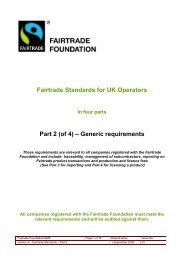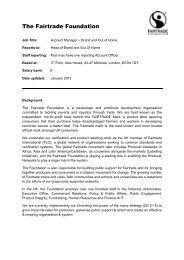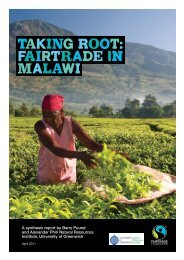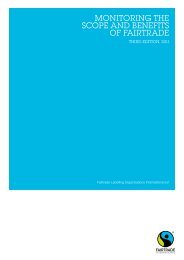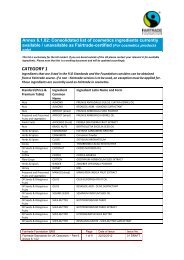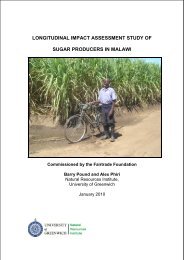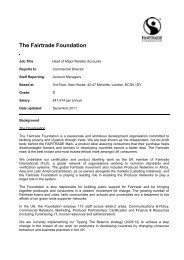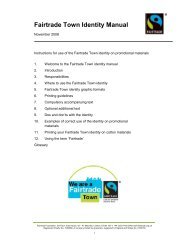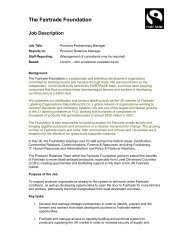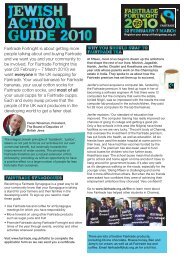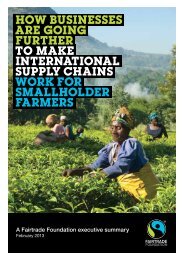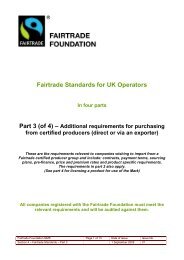the great cotton stitch-Up - The Fairtrade Foundation
the great cotton stitch-Up - The Fairtrade Foundation
the great cotton stitch-Up - The Fairtrade Foundation
Create successful ePaper yourself
Turn your PDF publications into a flip-book with our unique Google optimized e-Paper software.
In 2003 <strong>the</strong> C-4 became a cause célèbre among<br />
campaigners sparking interest in some sections of<br />
<strong>the</strong> West’s media. <strong>The</strong> C-4 was seen as a litmus test<br />
for whe<strong>the</strong>r <strong>the</strong> DDR was truly pro-poor. To a degree,<br />
pressure paid off. Five years ago, <strong>the</strong> WTO attempted<br />
to thrash out a <strong>cotton</strong> trade framework that would see<br />
<strong>the</strong> phase-out and elimination of US and EU trade<br />
distorting <strong>cotton</strong> subsidies.<br />
But as we now enter <strong>the</strong> 10th year since <strong>the</strong> DDR was<br />
launched, pledges made have not been implemented.<br />
After initial attention, <strong>the</strong> C-4’s story has faded from<br />
view. So it is time to remind ourselves what is at<br />
stake. <strong>The</strong> Great Cotton Stitch-<strong>Up</strong> tells <strong>the</strong> story of<br />
self-serving failure to find a resolution that would<br />
enable 10 million of <strong>the</strong> world’s poorest people to<br />
trade <strong>the</strong>ir way out of poverty more effectively.<br />
While <strong>the</strong> DDR has floundered, <strong>the</strong> last decade<br />
has seen <strong>the</strong> rapid growth of <strong>the</strong> global Fair Trade<br />
movement, bringing toge<strong>the</strong>r producers and consumers<br />
in a citizens’ movement for change. Fair Trade seeks<br />
to develop trading partnerships based on dialogue,<br />
transparency and respect which promote <strong>great</strong>er<br />
equity in international trade. <strong>The</strong> success of <strong>Fairtrade</strong><br />
certification in <strong>the</strong> UK, and beyond, shows that <strong>the</strong>re<br />
is an appetite for a trading system based on such<br />
principles. It is time for our global leaders to respond.<br />
<strong>The</strong> Great Cotton Stitch-<strong>Up</strong> also offers recommendations<br />
for a fairer trading system at this pivotal moment. <strong>The</strong><br />
world is now entering into a period in which <strong>the</strong> shape<br />
of global trade will be shaped for <strong>the</strong> decade.<br />
In <strong>the</strong> week this report is published, <strong>the</strong> European<br />
Commission will release a draft proposal for <strong>the</strong><br />
reform of <strong>the</strong> Common Agricultural Policy, currently<br />
costing €45bn. And earlier this year, Congress started<br />
negotiating a new Farm Bill replacing <strong>the</strong> current<br />
$288bn five-year programme of US agricultural support.<br />
<strong>The</strong> CAP and <strong>the</strong> Farm Bill are hugely expensive and are<br />
harder to justify in <strong>the</strong> current economic climate. <strong>The</strong>y<br />
also place <strong>great</strong> emphasis on subsidising <strong>cotton</strong> growers.<br />
As <strong>the</strong> world struggles to emerge from a global economic<br />
crisis which has exacerbated extreme poverty in<br />
vulnerable countries, new approaches are required. <strong>The</strong>re<br />
is no better time to unpick <strong>the</strong> Great Cotton Stitch-<strong>Up</strong>.<br />
‘<strong>The</strong> West African C-4 is<br />
a litmus test for whe<strong>the</strong>r<br />
<strong>the</strong> Doha Trade Round is<br />
truly pro-poor.’<br />
Pascal Lamy, Director General of <strong>the</strong> WTO<br />
‘<strong>The</strong> majority of WTO members<br />
are developing countries. We<br />
seek to place <strong>the</strong>ir needs and<br />
interests at <strong>the</strong> heart of <strong>the</strong><br />
Work Programme adopted in<br />
this Declaration.’<br />
WTO Ministerial Declaration 2001<br />
‘Our demand is simple:<br />
apply free trade rules not<br />
only to those products that<br />
are of interest to <strong>the</strong> rich<br />
and powerful, but also to<br />
those products where poor<br />
countries have a proven<br />
comparative advantage.’<br />
Amadou Toumani Touré,<br />
President of <strong>the</strong> Republic of Mali<br />
‘<strong>The</strong> West African Cotton-4<br />
case reveals how <strong>the</strong> global<br />
trade system works against<br />
<strong>the</strong> interests of <strong>the</strong> world’s<br />
poorest farmers. Cotton is<br />
cheaper to produce from West<br />
Africa than anywhere else.<br />
But subsidies from rich power<br />
blocks stop West African<br />
farmers getting a fair price.<br />
It is a situation that needs<br />
to change and <strong>the</strong> time for<br />
change is now.’<br />
Michael Nkonu, Director of <strong>Fairtrade</strong> Africa<br />
6 <strong>The</strong> <strong>great</strong> <strong>cotton</strong> <strong>stitch</strong>-up <strong>The</strong> <strong>great</strong> <strong>cotton</strong> <strong>stitch</strong>-up 7



